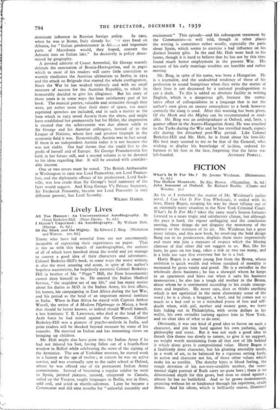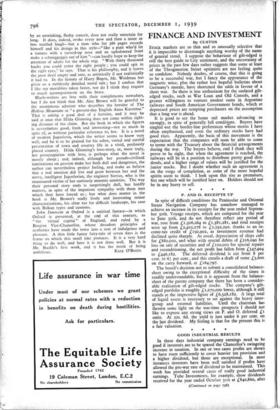FICTION
As far as I remember the matter of Mr. Weidman's earlier novel, I Can Get It For You Wholesale, it ended with its hero, Harry Bogen, scraping his way by sheer villainy out of an extremely nasty situation in the New York Criminal Court. What's In It For Me? takes the same man's brazen fortunes forward to a more tragic and satisfactory climax, but although the pace is hard, the vigour unflagging and the conclusion moving, these things do not disguise the monotony of the journey or the staleness of its air. Mr. Weidman has a great many talents, and this new book, by resolving the bold design flung out in its predecessor, displays them more impressively and must win him a measure of respect which the blazing clamour of that other did not suggest in us. But, like his hero, he goes on too long, takes a risk or two too many, and is a little too sure that everyone but he is a fool.
Harry Bogen is a smart young Jew from the Bronx, whose ambition is quick wealth and whose standard of morality is measured by gross vanity and greed. He is a swindler in the wholesale dress business ; he has a showgirl whom he keeps in an apartment and hires out when it suits his business manoeuvres ; he also has a tough old mother in the Bronx, about whom he is sentimental according to his crude concep- tions and impulses. He never says, does or thinks anything which is not egotistical in the most elementary sense of the word ; he is a cheat, a braggart, a heel, and he comes not so much to a bad end as to a wretched pause of loss and self- doubt when, with girl, mother and money gone, we leave him hiding out in Philadelphia, with seven dollars in his wallet, his own swindles turning against him in New York, and no clear idea of what to do next.
Obviously, it was one kind of good idea to fasten on such a character, and pin him hard against his own pathetic, ugly philosophy and scene. But it was not such a good idea to thrash this theme too slowly to tatters, to give it no support, no weight worth mentioning from all that rest of life behind it which alone gives it compositional value. Harry Bogen is a faultlessly done character, but his gloating amorality needs, in a work of art, to be balanced by a vigorous setting forth, in action and character not his, of those other values which make his so terrible. The sketchy hints at blood feeling, the rough devotion of his not-very-credible mother, the senti- mental slight portrait of Ruth carry no guns here ; there is no dimensional depth for this gross, bad man to stand against ; almost he has no battlefield. And so he grows monotonous, prancing without let or hindrance through his repetitive, crude dance. And his idiom, which is brilliantly coarse, illumined by an unwinking, flashy conceit, does not really entertain for long. It does, indeed, evoke every now and then a more or less startled laugh—but a man who for 386 pages records himself and his doings in this style—" like a putz who'd let a tomato with a turned-up nose and an upholstered front make a schmiggeggie out of him "—can hardly hope to keep the attention of adults for the whole trip. " With thirty thousand bucks you could yentz the right people ; you could spit in the right eyes," he says. That is his philosophy, and it leaves the poor devil empty and sore, as artistically if not realistically it had to. In the history of Harry Bogen, Mr. Weidman has given us a ruthlessly detailed moral tale ; but I confess that I like my moralities taken faster, nor do I think they require so much accompaniment on the brass.
Blurb-writers are free with their compliments nowadays, but I do not think that Mr. Alec Brown will be grateful to the anonymous admirer who describes the heroine of The Hollow Mountain as "a present-day English Anna Karenina." That is asking a good deal of a heroine, and it may be said at once that Hilda Glenning does not come within sight- ing distance of the claim. But the book in which she figures is nevertheless good, fresh and interesting—not so much in spite of, as without particular reference to, her. It is a novel of modern Jugoslavia, which the writer seems to know very well, and he is to be praised for his sober, varied and careful presentation of town and country life in a vivid, perilously placed country. Hilda Glenning's love-story, or, more truly, her preoccupation with love, is perhaps what the novel is mostly about ; and, indeed, although her pseudo-civilised ruminations on passion make her both dull and dangerous, the author can nevertheless project feeling, and make us believe that a real emotion did live and grow between her and the nervy, intelligent Jugoslavian, the engineer Stevan, who is the enamoured victim of her curiously anaemic anxieties. The way their personal story ends is surprisingly dull, but hardly matters, in spite of the impatient sympathy with them into which they have forced us ; but what does matter in the book is Mr. Brown's really lively and interesting minor characterisations, his clear eye for difficult landscape, his ease with Balkan types and customs.
Sohn Innocent at Oxford is a satirical fantasy—in which Oxford is presented, at the end of this century, as
" the virtual capital " of England, and ruled by a Borgian Vice-Chancellor, whose decadent principles of aesthetics have made the town into a seat of indulgence and pleasure. A thin little funny fairy-tale of seven days is the frame on which this small joke postures. It is a very hard thing to do well, and here it is not done well. But it is Mr. Buckle's first work, and it has the merit of being













































 Previous page
Previous page